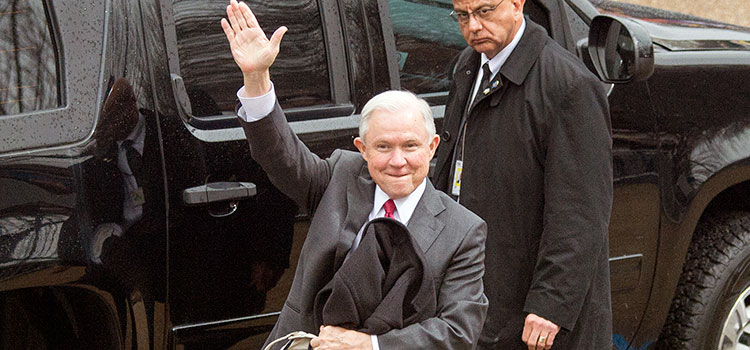In his written responses to senators, President Donald Trump’s attorney general nominee Alabama Sen. Jeff Sessions continued to be vague on his cannabis stance. During his confirmation hearing earlier this month, Sessions offered little insight into how he would approach the issue, saying that if cannabis prohibition was “not desired any longer” at the federal level Congress “should pass a law and change the rule.”
In a written response to Sen. Dianne Feinstein, Sessions said that he is “generally familiar with the Cole memorandum” but that he would “review and evaluate those policies”
“As former Attorney General Loretta Lynch herself said during her confirmation hearings almost two years ago, marijuana is still a criminal substance under federal law, and it is also still illegal under federal law not only to possess marijuana, but to distribute marijuana,” Sessions said in his response. “I echo Attorney General Lynch’s comments, and commit, as she did, to enforcing federal law with respect to marijuana, although the exact balance of enforcement priorities is an ever-changing determination based on the circumstances and the resources available at the time.”
In a response to another question by Feinstein regarding the health and science communities take on the medical benefits of cannabis, Sessions indicated he would “defer to the American Medical Association and the researchers at the National Institutes of Health and elsewhere about the medical effects of marijuana,” admitting that he has not studied “the relevant regulations in depth.”
Sen. Dick Durban asked Sessions about his personal opinions about cannabis use, specifically his statement that “good people don’t smoke marijuana.” Sessions responded by saying his “words were grossly mischaracterized” and provided the full context of the quote from an April 2016 Senate Caucus on International Narcotics Control:
“I’ll just comment, because I was talking to somebody that’s experienced in this, recently; it was the prevention movement that really was so positive. And it led to this decline, to the creating of knowledge that this drug is dangerous, you cannot play with it, it’s just not funny it is not something to laugh about, and trying to send that message with clarity that good people don’t smoke marijuana. And the result of that is, to give that away and make it socially acceptable, creates the demand—the increased demand that results in people being addicted or impacted adversely. I just hope that we can get our thoughts together on it. I believe the Department of Justice needs to be clearer, I believe the President really needs to reassert some leadership on this; I think it’s really serious.”
However, in a follow-up response to Durbin, he described cannabis as a “dangerous” drug.
When asked by Sen. Patrick Leahy whether his comments that he “won’t commit to never enforcing federal law” should be taken to mean that he would “consider arresting and prosecuting patients who follow their state medical marijuana law,” Sessions was, again, evasive.
“Whether an arrest and investigation of an individual who may be violating the law is appropriate is a determination made in individual cases based on the sometimes unique circumstances surrounding those cases, as well as the resources available at the time,” he wrote.
However, in what is perhaps the most telling statement from his responses as they relate to the legal cannabis industry, is his answer to Leahy regarding the Ninth Circuit case that bolstered the U.S. Department of Justice decision to allow cannabis operations in legal states. Sessions admitted that he was “not familiar” with how courts were interpreting the Justice Department decision but he seemed to make a clear distinction between medical and adult-use statutes, which could be troubling as several states move toward recreational markets.
“As an emerging issue, that is one that will need to be closely evaluated in light of all relevant law and facts. If I am fortunate enough to be confirmed as Attorney General, I will conduct such a review,” he wrote. “Of course, medical marijuana use is a small part of the growing commercial marijuana industry.”
According to a Politico report, the Senate Judiciary has decided to delay Sessions’ confirmation vote until next week.
